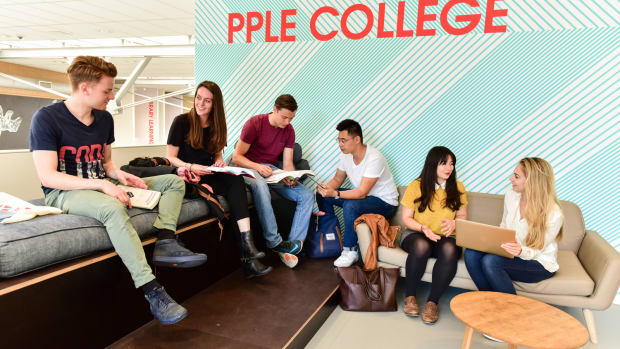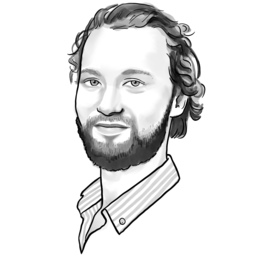
PPLE celebrates 10 years: “Socioeconomically we’re not that diverse”
The interdisciplinary study of Politics, Psychology, Law, and Economics is still hugely popular but highly selective. What position does the study occupy within the university? PPLE dean Radboud Winkels reflects on the program of study, 10 years after its founding.
“Overwhelming” is what Folia called in 2014 the interest in the then newly established PPLE bachelor's program - an abbreviation for Politics, Psychology, Law, and Economics. The interdisciplinary study, founded after an Anglo-Saxon example by then-law dean Edgar du Perron, had not even been accredited yet when it already had 400 applications. Of those, 100 were eventually admitted.
Now 10 years later, the all-English PPLE is still at least as popular. The number of applications has increased exponentially to 1,600 to 1,800 students per year and there is still room for only a fraction of them (this year some 200 students).
All go through an extensive admissions process and pay double the regular tuition. Add to that the arrival of the crown princess and the opening of its own renovated building on the Roeterseiland campus (shared with UvA Academy and the FEB's executive program), and you get the picture of a UvA education with a highly exclusive character.
On the occasion of the study program’s 10th anniversary, Folia speaks to PPLE Dean Radboud Winkels. What image does he have of the program, and what has changed in the past decade?
Does the exclusive nature of the program in the year 2024 still befit a university that values equality and inclusion?
“There is some contradiction there, of course. Our student population is diverse on many fronts, such as religion and nationality. But if you look at socioeconomic background we probably aren’t as diverse.”
In this area, you sort of end up with the elite, right?
“The elite, the privileged, whatever you call it these days. Look, it’s not obvious that someone from the poorer regions of Bangladesh would come up with the idea of studying in the Netherlands, let alone at a selective program. But we do try to do something about that, for example, through scholarship programs. We have also adjusted our communication to create different expectations. At the same time, the entire university is not yet as diverse as one might wish. It just applies to our program perhaps just a bit more.”
How problematic is that?
“On the other hand, precisely because PPLE is so selective, we educate smart, ambitious, and socially engaged people. And there is a lot of social need for that. Not only with master’s students but also with companies, NGOs, and the government.”
Du Perron wanted to provide PPLE students with a broad social base. Isn't that at the same time the downside of the study? You learn a little bit of everything.
“If you looked at our curriculum, I wonder if you would still think that. First of all, I think that the employers just mentioned have a great need for broadly educated students. Also, it is a tougher program. That means that in the economics component, our students are doing the same thing in a shorter time frame as students taking an entire economics bachelor’s degree. So the students largely get the same coursework. It’s also an illusion that many students still know everything from their bachelor's and that you must have completed a bachelor's in psychology to also do a master's in it. Our students prove this is not the case because they simply move on to the master’s and do well or even excel there.”
The study also remains as popular as ever, as evidenced by the application figures. One of the current students is Crown Princess Amalia of Orange-Nassau. Has her arrival caused an increase in applications?
“No doubt the fact that the crown princess is pursuing this program has helped with the program's name recognition. Especially among students from the Netherlands. But it has not (yet) led to an explosion in the enrollment figures. Applications have declined slightly in recent years. I attribute that mainly to the housing shortage in Amsterdam. You see it particularly among students from outside the European Union. If they haven't found a room shortly before starting their studies, it is a very big step for them to get on a plane and come here.”
Have many things changed about the study in the last decade?
“Yes, where in the selection process we first had students write an essay; we now have them do trial study. This has two advantages: The students already get a good impression of the program of study and, in addition, it is easier to check than essays, which you can easily have AI do these days. The possibility to do an internship or exchange has also been added. Both are not an obligation, but an option.”

